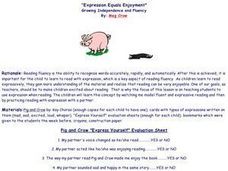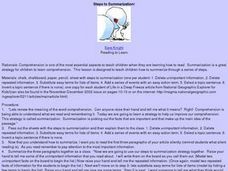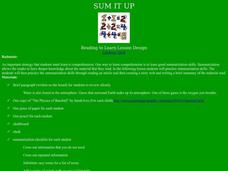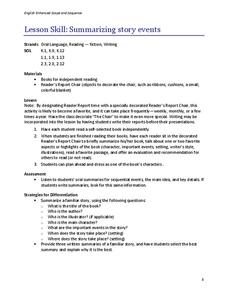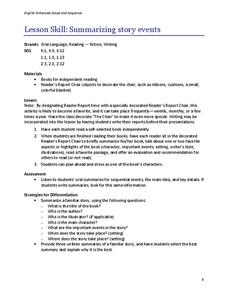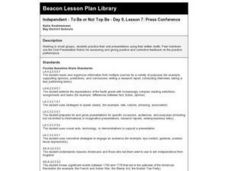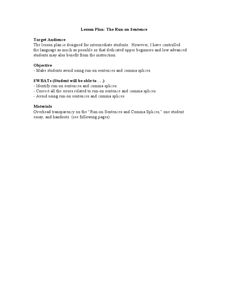Curated OER
"Expression Equals Enjoyment"
Students practice strategies to become more fluent readers with expression. They observe the teacher modeling fluent and expressive reading of the book, "Pig and Crow," by Kay Chorao and then model what they've observed with expression...
Curated OER
The Five W's!
Students explore reading comprehension strategies. They discuss the story-grammar strategy. Students discuss the importance of comprehension. They discuss questions they should ask while reading a text. Students read a story and stop to...
Curated OER
Steps to Summarization!
Students practice summarizing what they have read. They review the meaning of comprehension. Students go through the steps needed in order to summarize a passage. They pick out the main parts/ideas of what they have read. Students...
Curated OER
Close Your Eyes and Imagine...
Young scholars practice the techniques and strategies to become more fluent readers through visualization. They read and construct mental images from the reading of a text. The book, "Charlotte's Web," by E.B. White is read in class and...
Curated OER
Presenting Poetry
Students encounter the fluency formula that states that it is important for kids to read and reread decodable words in a connected text. They must become effortless decoders in order to read fluently, and fluency in reading allows the...
Curated OER
What's the Main Idea?
Fourth graders comprehend what they are reading. An effective strategy for comprehension is summarization. They single out and explaining the main ideas of a passage. Students find a sentence or rewrite their own that covers...
Curated OER
Can You See It?
Students explore the concept of visualization and how it works to help them comprehend what they read. They read 'Tuck Everlasting' and visualize what has happened in the story. They draw a picture of what they visualized and then watch...
Curated OER
Sum It Up
After a review of the steps involved in writing a summary, class members read The Physics of Baseball by Sarah Ives and use a story web to identify the important details to include in their summary. Class members then choose an article...
Curated OER
Summarizing Story Events
Here is a way to build your pupils' public speaking abilities. The lesson plan describes a reader's report chair, which is used each week by a student who has just finished reading a book. The featured reader sits in the chair and talks...
Curated OER
Summarizing Story Events
After reading a book on their own, pupils prepare an oral report on the book, and sit in the "Readers Report Chair" when giving the report to the class. They are taught to briefly summarize the book by talking about one of two...
Curated OER
Independent - To Be or Not Top Be: Press Conference
Fourth graders deliver an oral presentation on the American war for independence to small groups. They use a rubric to give each other peer feedback on the strengths and weaknesses of their presentation.
Curated OER
Destination Reading
Students practice reading skills and comprehension through the use of computers and the educational software "Destination Reading" provided by Riverdeep in this self-directed lesson plan.
Curated OER
Reading Portfolio
Students record their own voices using microphones, computers, and reading selections and chart progress at recognizing words, phonics, word structure, and context clues. This elementary lesson uses the computer program Timeliner.
Curated OER
Class President
Fourth graders develop vocabulary to aid in comprehension as they read the novel, Class President.
National Endowment for the Humanities
Chinua Achebe's Things Fall Apart: Oral and Literary Strategies
Readers are first introduced to Chinua Achebe's Things Fall Apart by making a map of Africa. They will better understand the novel's historical and literary contexts, European and African literary traditions, and how...
Curated OER
Finders Keepers: Vocabulary Instructional Routine Guide for Extremely Loud and Incredibly Close
Like Oskar, the curious boy in Jonathan Safran Foer’s story, class members journey through other “stories that the mouth can’t tell” to find another sentence that uses a word found in novel. Individuals create their own vocabulary list,...
Curated OER
The Adventures of Huckleberry Finn: Semantic Feature Analysis
Racist, independent, conflicted? Readers of The Adventures of Huckleberry Finn brainstorm words that describe the traits of characters in Twain’s novel and then rate these qualities in several of their favorite characters. Individuals...
Curated OER
Writing as a group activity
Did you know that 50% of all Americans can trace a relative who traveled through Ellis Island? Relive these journeys with your class and then provide sentence strategy templates for them to use to compose their own informative...
Curated OER
Who's in the Shed?
Second graders examine the cover of the book, WHO'S IN THE SHED? and talk about the animals portrayed and the noises they make. They then read the book as a class, looking through the peepholes and making predictions.
Curated OER
Benedict Arnold Lesson Plan
Fourth graders read about and write a biography on Benedict Arnold.
Curated OER
The Run-On Sentence
Explore grammar rules by completing a worksheet. In this sentence structure lesson, kids define run-on sentences and read sample sentences to determine whether they are complete or incomplete. There is also a space for the writer to edit...
Curated OER
Jay Gatsby's Souvenir Scrapbook
Pupils create a Power Point scrapbook that compiles memorabilia representing the life of Jay Gatsby. They read the novel, "The Great Gatsby" and conduct internet research using the "American Twenties" website. In small groups, they...
Curated OER
Rest in Peace, Maniac Magee
Scholars read Maniac Magee and create epitaphs for each of the major characters using precise words reflecting the individual characters personality and nature. They will learn what an epitaph is and practice writing their own. They can...
Curated OER
Using Context
Teams practice decoding and using context strategies to determine the meanings of unfamiliar words. After verifying the meanings of words through the use of dictionaries, the Internet, thesauruses, and other sources, learners write the...
